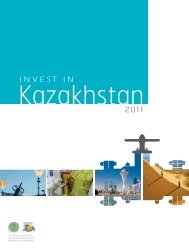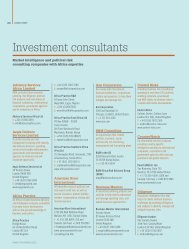NIGERIA Invest in 2012-13 - Newsdesk Media
NIGERIA Invest in 2012-13 - Newsdesk Media
NIGERIA Invest in 2012-13 - Newsdesk Media
You also want an ePaper? Increase the reach of your titles
YUMPU automatically turns print PDFs into web optimized ePapers that Google loves.
Despite decades of neglect that<br />
have left it lagg<strong>in</strong>g beh<strong>in</strong>d the<br />
energy sector, th<strong>in</strong>gs are about to<br />
change for agriculture. Peter Guest<br />
notes a determ<strong>in</strong>ation by the<br />
Nigerian government to <strong>in</strong>crease<br />
<strong>in</strong>vestment <strong>in</strong> farm<strong>in</strong>g, exploit<strong>in</strong>g<br />
an ideal environment and a wider<br />
market across West Africa<br />
For the past half-decade, Nigeria’s<br />
runaway growth rates have seen<br />
it enter more frequently <strong>in</strong>to<br />
<strong>in</strong>ternational <strong>in</strong>vestors’<br />
discussions. As a major oil<br />
exporter with an expand<strong>in</strong>g, youthful<br />
population of around 170 million, the<br />
country has seen <strong>in</strong>vestors flock<strong>in</strong>g to its<br />
f<strong>in</strong>ancial services, telecoms and hydrocarbon<br />
sectors. However, those are only part of the<br />
country’s economic story.<br />
While Nigeria’s foreign exchange<br />
earn<strong>in</strong>gs ma<strong>in</strong>ly come from the oil <strong>in</strong>dustry, a<br />
large proportion of its domestic economy is<br />
rural. Agriculture has not kept up with the<br />
country’s development or demographic<br />
trends, leav<strong>in</strong>g it heavily reliant on imports.<br />
However, with a new political drive and<br />
renewed private-sector <strong>in</strong>terest, the sector<br />
could be on the verge of a resurgence.<br />
Until the early 1960s, Nigeria was a<br />
net food exporter. However, as the oil<br />
<strong>in</strong>dustry began to dom<strong>in</strong>ate the domestic<br />
and <strong>in</strong>ternational agenda, the sector fell<br />
<strong>in</strong>to relative decl<strong>in</strong>e. Public- and<br />
private-sector capital for <strong>in</strong>vestment dried<br />
up, and <strong>in</strong>frastructure target<strong>in</strong>g agricultural<br />
areas was neglected.<br />
S<strong>in</strong>ce then, Nigeria has become reliant<br />
on expensive imported gra<strong>in</strong>, and now ships<br />
<strong>in</strong> more than 3.5 million tonnes per year,<br />
mostly from the US. Volatility <strong>in</strong> global prices<br />
for food – caused by unusual weather<br />
conditions – have also left the country,<br />
like many others, exposed to the vagaries<br />
of <strong>in</strong>ternational markets. High and ris<strong>in</strong>g<br />
AGRICULTURE AND WATER 147<br />
prices, too, have contributed to <strong>in</strong>flationary<br />
pressures, reduc<strong>in</strong>g the positive impacts of<br />
economic growth <strong>in</strong> Nigeria.<br />
It has long been accepted that Nigeria<br />
needs to diversify its economy <strong>in</strong> order to<br />
unlock itself from its current dependency<br />
on <strong>in</strong>ternational oil markets whose<br />
fluctuations <strong>in</strong> the past few years of global<br />
uncerta<strong>in</strong>ty have caused difficulties across<br />
export<strong>in</strong>g nations. The comb<strong>in</strong>ation of this<br />
imperative to f<strong>in</strong>d new sources of revenue<br />
and employment, as well as the demographic<br />
necessity – and opportunity – is driv<strong>in</strong>g a new<br />
focus on agriculture <strong>in</strong> the country.<br />
Nigeria’s population is urbanis<strong>in</strong>g and<br />
becom<strong>in</strong>g more wealthy. The country’s<br />
economy has been grow<strong>in</strong>g un<strong>in</strong>terrupted for<br />
a decade, driven <strong>in</strong> large part by the oil<br />
<strong>in</strong>dustry, although f<strong>in</strong>ancial services,<br />
telecoms and technology, and construction<br />
have all begun to develop.<br />
Richer societies<br />
The commercial capital of Lagos is fast<br />
becom<strong>in</strong>g one of the cont<strong>in</strong>ent’s mega-cities,<br />
grow<strong>in</strong>g <strong>in</strong> size and population. Richer urban<br />
societies consume more, and their diets<br />
typically change to <strong>in</strong>clude more prote<strong>in</strong>, <strong>in</strong><br />
turn requir<strong>in</strong>g far greater production of<br />
agricultural commodities as feed for livestock.<br />
Jacques Taylor, director of agricultural<br />
bank<strong>in</strong>g at Standard Bank, recently relocated<br />
to Nigeria from South Africa <strong>in</strong> order to<br />
spearhead the bank’s drive <strong>in</strong>to West African<br />
agribus<strong>in</strong>ess. In pure output terms, Nigeria<br />
is already the largest agricultural producer<br />
<strong>in</strong> sub-Saharan Africa, Taylor notes. While<br />
there are serious gaps <strong>in</strong> the country’s<br />
<strong>in</strong>frastructure, and the fragmented nature<br />
of the <strong>in</strong>dustry makes the challenges acute,<br />
the decl<strong>in</strong>e is not term<strong>in</strong>al. “It is important to<br />
acknowledge that Nigeria has pockets of<br />
well-structured and viable bus<strong>in</strong>esses <strong>in</strong> the<br />
agricultural sector – where entrepreneurs and<br />
corporates manage to establish and grow their<br />
bus<strong>in</strong>esses despite <strong>in</strong>frastructure challenges<br />
and <strong>in</strong>efficient value cha<strong>in</strong>s,” Taylor says.<br />
INvEsT IN <strong>NIGERIA</strong> <strong>2012</strong>-<strong>13</strong>







